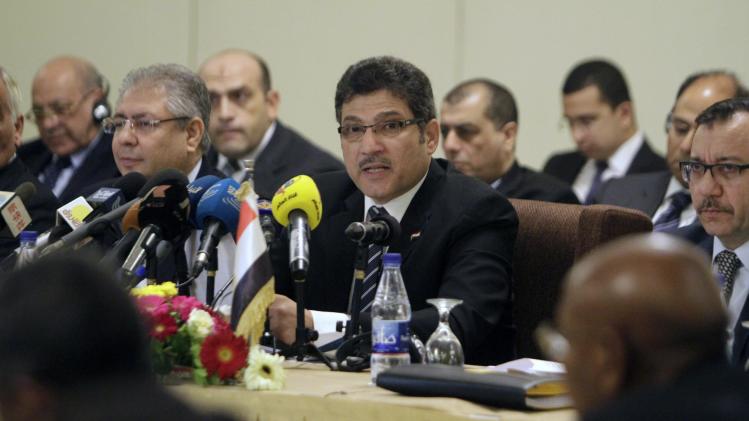A A ministerial-level meeting in Khartoum including Egypt, Ethiopia, and Sudan to establish mechanisms for further investigations of the consequences of the Grand Ethiopian Renaissance Dam (GERD) downstream has concluded, on Tuesday, August 26. The gathering took place two months after Egypt and Ethiopia had issued ajoint communique that stressed the importance of the contested water of the Nile River for the two countries and outlined general principles for future moves to resolve disagreements. The statement was a result of an encounter between Egypt’s President Abdel Fattah al-Sisi and Ethiopia’s Prime Minister Hailemariam Desalegn, during the African summit in Malabo, Equatorial Guinea.
The conveners in Tuesday’s meeting put together a procedure for follow-up on a preliminary report by an international panel of experts that had rung alarm bells in Cairo about the potential damage the GERD could inflict on Egypt’s water supply. Cairo’s position on the dam is not entirely clear; officials have reportedly said that they wanted the GERD scaled down considerably, while Irrigation Minister Hossam al-Moghazi himself was cited as saying that Egypt regarded it with a new “vision,” without further clarification. Egyptian officials seem to be banking on Ethiopia’s purported inability to finance the project, whereas their Ethiopian counterparts insist the project will be completed regardless of whether it wins Egypt’s approval or not.
The standoff over the GERD is fundamentally a conflict over who gets how much of the Nile’s water. Future talks among the three states of the Eastern Nile’s eastern basin – which provides 85 percent of the river’s total flow – therefore have to grapple first and foremost with the question of water apportionment. Although it would be partial, a resolution to the conflict in this part of the basin would serve as a model for a comprehensive pact that includes the other eight co-riparians.
“There may not be enough water for everybody to get all they want from the Nile’s waters, and so must share the burdens as well as the benefits, something states are usually reluctant to do.”
Both Egypt and Ethiopia face severe political and economic problems too numerous to elaborate, and their governments might be eager to show the citizenry progress on a major issue. That the ministerial meeting in the Sudanese capital was successful may be a sign of such eagerness.
Sudan’s midstream location between Ethiopia and Egypt has accorded it a pivotal place in the Nile dispute, which is also a dilemma. The choice of Khartoum as the site for the talks rather than Addis Ababa or Cairo is perhaps a nod to Sudan’s standpoint. Traditionally, Sudan made bilateral arrangements with Egypt over the Nile’s water. Recently though, it has come to favor the GERD, which it reasons will provide it with electric power at low cost and release a steady supply of silt-free water to its own already-silted dams. It is bound, on the other hand, to Egypt by the 1959 treaty which permitted the construction of the Aswan High Dam and fashioned their present water rights and joint management regime.
It would be hard for Sudan to alienate either neighbor: Ethiopia is upstream of the river, and Egypt could create difficulties for a country plagued by ethnic and political strife. Keeping in mind the vehemence with which Egypt and Sudan sparred in the past over the border area of Halayeb, wrangling over the Nile water could escalate in unpredictable ways. Sudan may reckon that securing its own interest lies in trying to bridge the gap between the two rivals.
But on what basis would the Nile’s water be divided? The Malabo communique highlighted the need for cooperation and reciprocity: Ethiopia pledged to avoid any possible harm from the dam to Egypt’s water usage, and Egypt to take into consideration Ethiopia’s development needs. Put together these commitments echo the core provisions of international water law.
Up until this month, there was only customary international water law. But as of August 17, 2014, the 1997 UN General Assembly’s Convention on the Law of Non-Navigational Uses of International Watercourses (“1997 UN Convention”) entered into force after being ratified by the requisite number of states. The law basically has two main components: equitable utilization and joint management. Egypt, Ethiopia, and Sudan, however, all abstained from the 1997 vote. Egypt and Sudan stayed away as they feared that “equitable utilization” would mean reduction of their current water quotas, and Ethiopia because it did not want joint management of its infrastructure, which entails systematic cooperation with the two downstream states.
The three countries subsequently accepted the equitable utilization principle in the Nile Basin Initiative (NBI), a cooperative venture of all the Nilotic nations. Unfortunately, Ethiopia swerved when it co-issued in 2010 with other upstream nations a Cooperative Framework agreement which replaced the legal concept of equitable utilization with the language of “water security.” Both Egypt and Sudan challenged this formulation, and the Framework has yet to enter into force. The three states can get around this hurdle by taking a pragmatic, good-will step and endorse the 1997 UN Convention, which will be the legal frame of reference for international water tribunals or arbitration, irrespective of their stance.
The equitable utilization principle in the UN Convention can be a start for negotiations, although not a bad one, since mutual consent to work within the frame of the law confers legitimacy on states’ demands and signals initial willingness for compromise. The rest of the negotiations are likely to be more politics and economics than law. Why? Because the criteria enumerated for utilization to be equitable are too elastic for forging agreements.
The principle itself competes also with a second historic principle — prior use or appropriation — which it appears to subsume in the UN Convention. Prior appropriation was the reigning doctrine in the US and Europe before the Industrial Revolution which, together with capitalism, created opportunities for large scale tapping of water resources as well as new uses and users. The more flexible equitable utilization doctrine was the legal scaffold that emerged from and facilitated the new opportunities and, not surprisingly, was transplanted to international water law. Implementation of the doctrine, however, is more feasible in countries with federal systems where courts are able to adjudicate water disputes than in a world of sovereign states lacking such venues and the associated enforcement mechanisms.
Equitable utilization signifies not equal shares, but equality of right to uses and benefits. It assigns water quotas according to what amounts to a maze of factors, none of which is paramount: geography and hydrology of the watercourse, avoidance of significant harm, social and economic needs, size of population in the basin, and alternative water sources. Yet many water specialists who have grappled with these criteria found them unwieldy, not least because no weights-- or hierarchy of importance-- are ascribed to the factors, and they often ended up with subjective weighting preferences or even eschewing the doctrine altogether. In negotiations, the elasticity of the factors opens the door for each co-riparian party to stress the factor(s) that it deems more advantageous. And we are back to power politics.
In the Nile basin, Egypt highlights its current intake of 55.5 billion cubic meters, its lack of alternative water resources, and how the Nile is the sole lifeline of its existence. At the same time it points to Ethiopia’s other rivers and untapped rainfall. Ethiopia builds its case on the preponderant contribution of its territory to the Nile flow, its poor economy, need to irrigate large areas to feed the rapidly growing population, and on what it regards as Egypt’s wasteful water exploitation practices. Egypt refers also to historical accords and understandings that granted it veto power over altering the flow of the river by Ethiopia, which it says carry over to the present era in accordance with the legal principle of state succession. Ethiopia, on the other hand, dismisses past accords as vestiges of the colonial era.
There may be a way out of these conundrums, and that is to ground the bargaining over water division in the factors of social, economic, and environmental needs. These needs necessarily account for the size of population and alternative water resources that can meet a portion of the needs. They are the bases on which countries justify their demand for re-apportionment or for maintaining existing allotments, as evident in the Egypt-Ethiopia communique: Ethiopia’s pledge not to cause harm to Egypt’s water uses, and Egypt’s recognition of Ethiopia’s development needs. Finally, a needs-based division is in the utilitarian spirit of equitable utilization which revolves around use, and has prevailed in most international watercourse agreements.
Needs are not easy to determine and require a consensus on a time frame. Still, it is possible to estimate the water required for the various uses in each nation: domestic, municipal, industrial, food production, and ecosystem maintenance. The chief water consumer is irrigated agriculture, and guaranteeing food production is also paramount in the minds of people and politicians. Hydroelectric power is usually a major need early on, and its relative contribution declines in subsequent years as the country industrializes and develops more power sources.
By assigning roughly the same water needs for each person in the Nile basin, and agreeing on population sizes, it is possible to quantify needs. Likewise, there is enough information to estimate the alternative resources in each co-riparian state—other rivers, groundwater, and rainfall that produces crops and animal feed. Egypt could also present plans for using irrigation water more efficiently, which is the equivalent of alternative resources. Egyptian experts often speak of the rainwater that is untapped in Ethiopia, but have yet to produce studies that indicate how and how much of this lost water can be harnessed and at what cost.
Making needs paramount as an equitable utilization criterion might sound like an easy technocratic way out. It may be so, but to accept it at as a principle is a question for politics. What does Ethiopia mean when it commits not to harm Egypt’s water usage? Would Ethiopia entertain Egypt’s demand to scale down the GERD, after it has turned it, as states are wont on doing with such megaprojects, into a grandiose nationalist symbol and bringer of progress? Would it put aside the claim to the Nile’s water based on its preponderant contribution to the river’s flow? What does Egypt propose when it pledges to recognize Ethiopia’s “development needs”? Would it be willing to reconsider its current share of 55.5 billion cubic meters, which Ethiopia finds excessive but which successive Egyptian governments have treated as sacrosanct? Which one of the two states possesses greater power resources to tilt the negotiations in its favor?
Such questions underline the fact that there may not be enough water for everybody to get all they want from the Nile’s waters, and so must share the burdens as well as the benefits, something states are usually reluctant to do.








